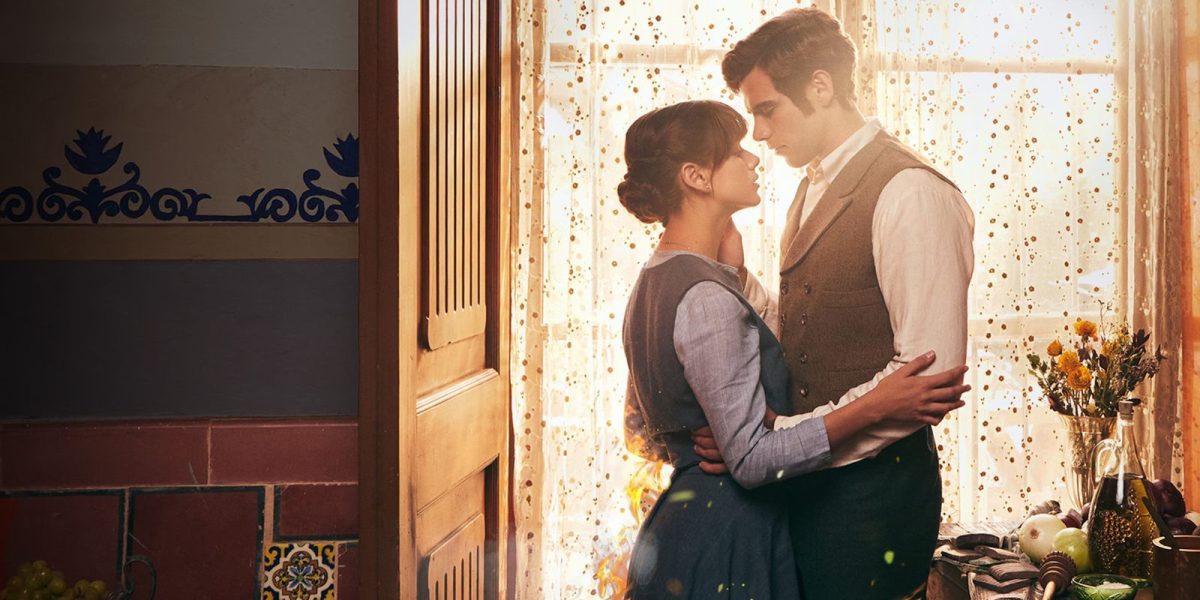
‘Like Water for Chocolate’ Review
Nov 2, 2024
HBO’s most recent Spanish-language series, Like Water for Chocolate, lives under two great shadows. The first one is, of course, Laura Esquivel’s seminal novel, a classic of Hispanic literature and one of the two finest examples of Mexican magical realism (curiously, the other one, Pedro Paramo, will also get a high-profile adaptation on Netflix this November). The second is the 1992 film adaptation starring Lumi Cavazos and Regina Torné, which remains highly regarded today as a key entry into the New Mexican Cinema movement of the late 20th century.
Thus, one could say Like Water for Chocolate is starting this race with something of a limp. How can you improve upon perfection? Indeed, ask anyone who’s read the 1989 novel or seen the 1992 movie, and they’ll tell you they are as close a thing to perfection as any novel or movie has ever come. And yet, I can’t help but admire the HBO series, not only for trying but for actually daring to do something refreshing with a story that, in many ways, might seem antiquated. Two episodes in, it hasn’t fully achieved its lofty expectations, but what is certain is that HBO’s Like Water for Chocolate is a bold reinterpretation of a classic, and for that, at least, it deserves respect.
What Is ‘Like Water for Chocolate’ About?
Image via HBO
For the uninitiated, Like Water for Chocolate is set in the early 20th century against the backdrop of the Mexican Revolution and tells the story of Tita de la Garza, played here by a wide-eyed and a bit too-polished Azul Guaita. A remarkable cook with near-uncontainable emotions, Tita lives in her family’s hacienda, Las Palomas, under the overbearing and cruel hold of her mother, Mamá Elena (Irene Azuela). She is in love with Pedro Muzquis (Andrés Baida), the handsome son of the wealthy owner of a nearby hacienda who shares her affection. There is only one problem: Mamá Elena quite literally hates Tita and has decided she will never marry; instead, Tita will remain by her side, caring for her until she dies.
When Pedro asks for Tita’s hand in marriage, he is soundly rejected. Mamá Elena, not wanting to waste a good marriage proposal and a generous dowry, instead offers him the hand of her eldest, more demure and plain daughter, Rosaura (Ana Valeria Becerril). Concluding that his only way of staying close to Tita is by marrying Rosaura, Pedro accepts the proposal, thus starting a chain of events that will determine their lives for decades to come.
Rounding up the cast are Andrea Chaparro as Tita’s other sister, Gertrudis, Ángeles Cruz as the de la Garzas’ cook, Nacha, Mauricio García Lozano as Pedro’s father, Don Pedro Muzquiz, and Francisco Angelini as the kindly Dr. Brown. The series is executive produced by Mexico’s pride and joy, Oscar nominee Salma Hayek Pinault, alongside José Tamez and Siobhan Flynn.
At first glance, Like Water for Chocolate might seem like a rather antiquated story. Indeed, the plot is heavily rooted in Mexican small-town traditional values, the certainty that one must do what one is told without question or hesitance. Take Mamá Elena’s ruthless and often cruel treatment of Tita: this is a truly wicked woman who openly disregards and inflicts severe psychological damage onto her daughter. However, Tita takes it all in a stride, never answering with anything other than a quiet “Yes, mama.” This idea is still very prevalent in many parts of rural Mexico: one’s parents are sacred, and whatever harm they cause, intentional or unintentional, might not be fair, but it certainly is justified.
Then there’s Tita’s absolute love for Pedro, a young man who purports to love her yet agrees to marry her sister all the same. It’s an unconventional and possibly inflammatory spin on the traditional love story, and I do wonder how younger audiences who have never read the book will respond to it. On the page, Tita and Pedro’s love is not so much cultivated as it is predestined, born not out of casualty but fate. The 1992 film falls a bit short of portraying this mystical bond, and so does the show, at least in its first two episodes. Baida and Guaita are unbearably pretty and more than capable performers, but their connection is lacking. Tita and Pedro’s love defies understanding — it needs to be overwhelming, especially for the audience to support them once the plot advances. At least for the first two episodes of HBO’s adaptation, the spark hasn’t quite lit a fire.
Related From ‘Being John Malkovich’ to ‘Birdman’: 9 Best Uses of Magical Realism in Film These filmmakers use magical realism in wildly different ways.
‘Like Water for Chocolate’s Biggest Standout Character Is Its Antagonist
Image via HBO
Individually, Baida and Guaita fare well, if not greatly. She has the more difficult task, as Lumi Cavazos’ portrayal of Tita defined an entire generation of romantics. Her Tita lacks a bit of punch, but she seems comfortable enough in the role, and I trust she’ll blossom into it once the story progresses and Tita’s real challenges begin. For his part, Baida has the tough task of making something of a thankless role likable. Indeed, for all its strengths, Like Water for Chocolate’s male hero is more than a bit questionable. The HBO show turns him into a revolutionary, injecting him with moral righteousness and a sense of justice for the underprivileged who are at the forefront of the Mexican Revolution that he doesn’t quite have on the page. I understand the urge to do so — otherwise, Pedro might just be too much of a “nice guy” for modern audiences to stand, let alone root for.
Speaking of which, I’m curious to see where Like Water for Chocolate’s revolutionary story will go. In the book, the conflict mostly serves as the backdrop; once it finally arrives in Las Palomas, it is brief and decidedly apolitical, depicting the revolutionaries more as bandits (they were) than justice seekers (which they also were; in revolutions, nothing is only one thing or the other). Yet, the show seems fully committed to presenting the laborers’ fight against the government, a turning point in Mexican history that pretty much built the country’s current state.
Unsurprisingly, the true star of Like Water for Chocolate’s first two episodes is Azuela, who sinks her teeth into the tyrannical Mamá Elena and makes her more venomous and cruel than ever. The mighty Regina Torné did spectacularly in the 1992 movie, but Azuela more than lives up to the task, delivering a new spin that is less histrionic but just as brutal. Becerril and Chaparro are also standouts, with the former successfully keeping Rosaura on the sidelines but making her a noticeable presence, a shadow on the corner, ever-present yet often unnoticed.
‘Like Water for Chocolate’s Kitchen Needs More Attention
Image via HBO
There are two main issues in the first two episodes of Like Water for Chocolate. First is the lack of focus on Tita’s cooking. It’s a crucial aspect of the story, arguably the element most often related to it, so to see it not necessarily ignored but certainly not showcased is disappointing. This key storyline should’ve been at the forefront, openly celebrated and fully integrated into the narrative; instead, it’s treated more as a hobby of Tita’s rather than her life’s passion.
The second complaint is the subtler approach to magical realism. The genre is all about turning the ordinary into the extraordinary, the subtext into text. Magical realism thrives in finding the magic in everyday interactions to help us realize that the world is, indeed, full of mysticism and charm; a word isn’t a word but a poem; a kiss isn’t a kiss but a promise. Magical realism is as much about the atmosphere as it is about the visuals, and I wish Like Water for Chocolate understood it better.
Still, the show tries hard, and it mostly succeeds. It might make you question the characters at times, and you might even feel frustrated by Tita’s actions, but that’s very much the point. Like Water for Chocolate is all about frustration, how it’s an inherent part of life, and the way we all respond to it. To Tita, frustration translates to quiet longing for the love she feels lost forever. To Mamá Elena, frustration comes in the form of hatred, the bitter desire to make everyone as miserable as she is. To Rosaura, it’s a grudge, the silent realization that she will always be second best. To Nacha, it’s resignation, the weary acceptance of a life not lived. In Like Water for Chocolate, frustration is life’s constant companion, and this HBO adaptation does a rather good job of depicting that.
At its core, Like Water for Chocolate is an ode to life’s many cruelties and a warning that they are inescapable, try as you might to avoid them. And yet, there’s hope because there’s magic in every corner, and a simple bite of delicious food has the power to alter your fate if you only let it. If HBO’s adaptation understands this, then they’ll have done justice to Esquivel’s literary masterpiece; if it doesn’t, well, then you can always read the novel.
Like Water for Chocolate is available to stream on Max in the U.S. beginning November 3.
HBO’s Like Water for Chocolate boldly reinterprets the classic novel, even if it doesn’t successfully achieve every element.ProsThe series boasts sumptuous production values.There’s an added focus on the political turmoil of the time.The series features an incredible supporting cast, notably Irene Azuela as the villainous Mamá Elena. ConsThe central love story is not as convincing as it needs to be.The magical realism elements could be stronger.Tita’s culinary skills are not given the attention they deserve.
Set during the Mexican Revolution, Like Water for Chocolate follows Tita de la Garza, the youngest daughter in her family, who is forbidden to marry due to tradition. Her profound love for Pedro Múzquiz is expressed through her magical cooking, which conveys her emotions to those who taste her dishes.Release Date November 3, 2024 Creator(s) Curro Royo Cast Andres Baida , Azul Guaita , Irene Azuela , Ari Brickman , Ana Valeria Becerril , Andrea Chaparro , Ángeles Cruz Network HBO Latin America , HBO Latino Producers Salma Hayek Pinault , José Tamez , Clara Machado , Siobhan Flynn , Sharon Levy , Mariano Cesar , Jerry Rodríguez Burckle , Anouk Aaron , Alejandro Rincón , Manuel Vargas
Watch on Max
Publisher: Source link
Mandy Moore Shares She’s Unsure If Her Home Survived
California Fires: Mandy Moore Shares She's Unsure If Her Home Survived On Tuesday, Mandy shared on her Instagram story that she, her children, and her pets left their home and were safe. "Evacuated and safe with kids, dog and cats.…
Jan 13, 2025
YouTubers Colin, Samir Lose Homes to L.A. Fire as Wives Are Pregnant
Angelina Jolie, Halle Berry, Jamie Lee Curtis & More Stars Are Giving Back Amid LA FiresYouTubers Colin Rosenblum and Samir Chaudry are opening up about their heartbreaking situations. The duo, otherwise known on the platform as Colin and Samir, recently…
Jan 13, 2025
These Are '80s Songs That Gen X'ers And Old Millennials Grew Up On, And There Is No Way Anyone Under 27 Has Heard All Of These
And if you are over 40, then you probably remember when these were brand-new and not songs kids are discovering on TikTok.View Entire Post › Disclaimer: This story is auto-aggregated by a computer program and has not been created or…
Jan 12, 2025
Tom Holland Asked Zendaya’s Dad for Permission Before Proposing
Tom Holland wove the perfect engagement for Zendaya. Less than a week after the Spider-Man actress debuted a 5-carat diamond ring on her left ring finger at the 2025 Golden Globes, Tom's father Dominic Holland confirmed the couple's engagement, sharing a few parts about the special day, including one important detail.…
Jan 12, 2025











